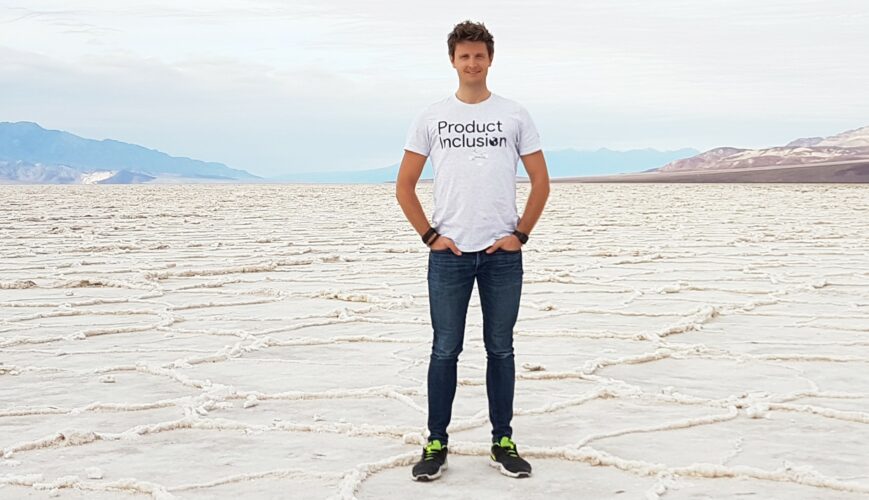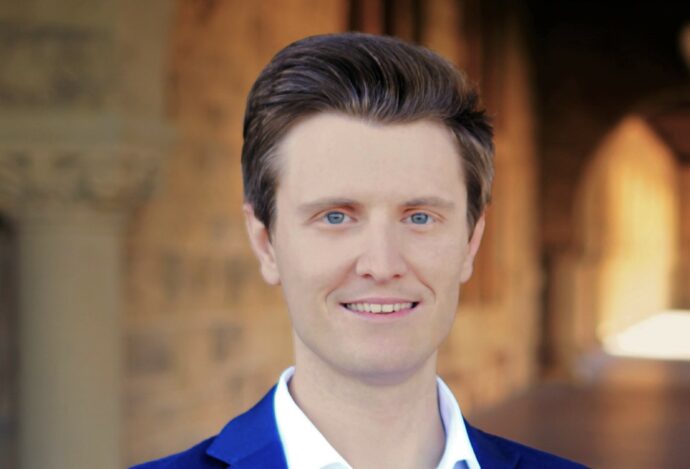Matteo Zallio, an Inclusive Design Activist
“Since I was a child I have always asked why; and built something with everything I found.”
Dr Matteo Zallio is an award-winning designer, researcher, and adjunct professor. He is a By-Fellow at Hughes Hall, a visiting researcher at the Department of Engineering, University of Cambridge, a Senior Researcher at Autodesk, an adjunct faculty member at Dublin City University.
His research focuses on the study and design of inclusive products and experiences for users of all abilities, and he has recently founded a research initiative as well as an institute on the discipline of metavethics, exploring the ethical implications for interaction, inclusion and impact in the metaverse.
“I was born in Italy where I studied Architecture and, after a period of consultancy as an architect I decided to pursue a PhD in User Experience Design because I wanted to consolidate my passion for understanding how things work and discover how to design innovative solutions that answer people’s needs.”

Dr Matteo Zallio has founded a research initiative and an institute on the discipline of metavethics, exploring the ethical implications for interaction, inclusion and impact in the metaverse.
“During my work as an architect, I discovered a passion to learn more about research methodologies to help me to understand, with an evidence-based approach, the multifaceted challenges that afflict users with various abilities. That was when I started to strongly focus on designing inclusive and accessible products and environments for people with different abilities, and older adults. I then applied for a scholarship and began a PhD in User Experience Design at the University of Genova in Italy, and Loughborough University, UK.”
Increasingly committed to the importance of designing for and with people to improve accessibility, after his PhD Matteo moved to Ireland at Technological University Dublin as an A. Graves Research Fellow in the School of Electrical and Electronic Engineering, working as a UX researcher on developing Human-Centred Assistive Technologies. During his time in Ireland, he raised more than 1 million Euros in research grants and founded one start up.
Next stop California, at the Stanford University with a Fulbright fellowship that allowed Matteo to discover new opportunities across Silicon Valley, and connect with leading international scientists, while continuing research on Inclusive Design, Creativity and Innovation.
Research in a pandemic
Later on, during the COVID-19 pandemic, Matteo started at the University of Cambridge as a Marie Curie Senior Fellow and as a Research Associate at Hughes Hall, coinciding with the pandemic and associated restrictions across the UK.
“I started my journey at Hughes in February 2021, so I wasn’t able to fully appreciate the community I joined. However, there were digital networking opportunities and socials across the College which meant I could meet friendly people and connect with researchers. Who knew online cheese-tasting could be so rewarding!”
“An opportunity to speak at a Hughes Hall Seniors’ Symposium as we emerged from lockdown was a poignant moment – I was finally able to appreciate the diverse community of academics I had joined – in person! As a new research fellow in town, and with little previous connection to the College or my peers, I had a very sobering insight into the isolation caused by spaces that don’t work for us – in my case due to relocation during a national lockdown.”
“Since the end of the restrictions, I have been able to appreciate the beauty of the postdoc community at Hughes Hall: an amazing group – and space – that sets you up for success! It warms my heart to be surrounded by so many inspiring and positive people. I had several chances to connect with so many fellows, scientists, friends at Hughes Hall and our ‘Postdoc Brunch’ is always a highlight.”
Academic Focus
“As a Marie Curie-funded project I developed the IDEA toolkit, a set of tools to facilitate building industry professionals with the implementation of their design process, under the spotlight of inclusion, diversity, equity, and accessibility. The results of this work included collaborations and consultancy with several international companies that successfully enabled designers to make inclusion central to their approach while empowering building occupants to be included in the whole design process.”
Matteo’s prioritisation of inclusion within all design environments is far-reaching, spanning physical spaces such as smart homes and IoT and virtual, immersive spaces including the metaverse and virtual reality. He optimises his influence and impact by working, consulting, and coaching alongside his research; and has an agile approach to his career trajectory.
“I’m hoping to spend a few years as a lead researcher focusing on inclusive design for tech companies to build up experience in product end-to-end delivery and then bring my learning back to academia to boost the development of cutting-edge research and new educational approaches”.

“I want to influence the mindset shift of designers and architects of the future, based on the idea that in the future not only physical environments will have to be inclusive and accessible, but also digital, virtual, and immersive environments.”
What’s next
“The areas I want to influence include the mindset shift of designers and architects of the future, based on the idea that in the future not only physical environments will have to be inclusive and accessible, but also digital, virtual, and immersive environments.”
He has recently established the Metavethics Institute, to help organisations navigate the metaverse and develop the technologies to deliver inclusive and accessible services within digital, virtual, and immersive environments.
Alongside this, and with the cooperation and support from Hughes Hall’s Digital Education Futures Initiative (DEFI), he has launched the Sustainable Ethics for Inclusive Digital Environments initiative (SEIDE) to develop research, educational practices, and policies to advance positive change for new human-technology interactions, particularly within the field of metavethics.
Both the SEIDE Initiative and the Metavethics Institute represent something very new – in thought-leadership, primary research and impact for the future tech sector.
“I feel I am at a very important time in my own development – and in the development of my work and research. The point at which design meets inclusion and technology is where all my specialisms collide and it is a very exciting – and very futuristic – space.”
To connect
- To read more about Matteo’s work: https://www.matteozallio.com/about
- And about Metavethics.com.
- To get in touch with Matteo about possible collaborations: mz461@cam.ac.uk
- If you would like to explore our senior membership: https://www.hughes.cam.ac.uk/about/our-people/seniors-members/
- For more on our Postdoc research community: https://www.hughes.cam.ac.uk/academic/study-and-research/.
Tell your story
We always love to hear from our research community – to tell us about your journey to Hughes Hall, your research and aspirations, please email comms@hughes.cam.ac.uk.
17.4.23





